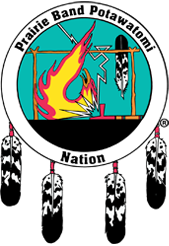The Last Buffalo
William Mzhickteno recalls the story, recounted to him by his father and other Potawatomi tribesmen, of the Potawatomi’s final buffalo hunt in the late 19th century.
The Potawatomi were anticipating a long, cold winter. Since buffalo were an important food source, preparations were made for a hunt. The Potawatomi had not only become adept at curing and preserving buffalo meat, they were also skilled at transforming buffalo hides into attractive, functional blankets.
Federal regulations at that time required the Potawatomi to secure permits from the local Indian agent before leaving the Reservation . With permit in hand, the Potawatomi hunting party, including Mzhickteno’s father, Joseph, and his grandfather, Wamego, traveled west in search of buffalo. The tribesmen experienced a long horseback journey, traveling through the present-day towns of Junction City, Lindsborg, Great Bend and Wakeeney, before finally locating a buffalo herd. There the Potawatomi hunting party took enough buffalo to satisfy their winter needs.
On the return trip through Graham County, the hunting party came across the crude settlement of Nicodemus. They found a black settlement whose members were “helplessly stranded, hungry and without any means of shelter.” It was apparent to the tribesmen, the settlers lacked the pioneering know-how to survive the winter. That night, over campfire light, the hunting party discussed the plight of the Nicodemus settlers. They decided to return the next day and help the settlers cut slough grass from a nearby creek, teaching them to build shelters similar to their own tribal homes.
“We can’t leave them this way,” said one of the Potawatomi. “They’ll have to have something to eat and skins to wrap themselves in.” The Great Spirit touched the hearts of the hunting party, and they agreed to give the Nicodemus settlers half their buffalo meat.
When the Potawatomi left for home, their loads were considerably lighter, but they felt justified in the knowledge they had saved a community. Mzhickteno characterized the sacrificial act as a “bright page in human history.” Upon returning home, the story of the Potawatomi hunting party quickly spread, and hunting party members were hailed as heroes.
